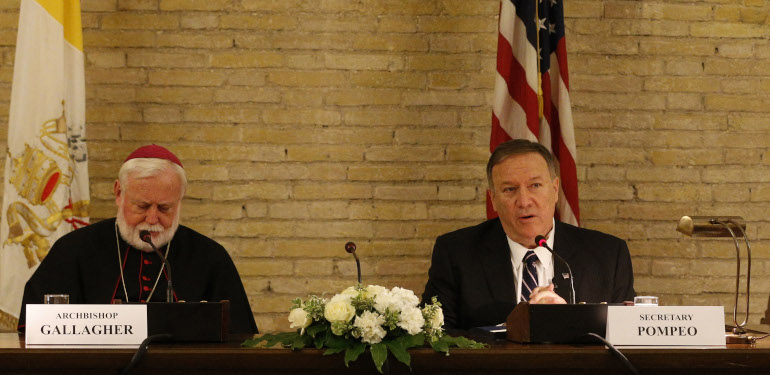
U.S. Secretary of State Mike Pompeo speaks at a symposium sponsored by the U.S. Embassy to the Holy See at the Vatican Oct. 2, 2019. Also pictured is Archbishop Paul Gallagher, Vatican secretary for relations with states. (CNS photo/Paul Haring)
U.S. Secretary of State Mike Pompeo criticized a number of global governments for persecuting religious minorities Oct. 2, speaking at a Vatican event as he struggles to deal with the impeachment inquiry of President Donald Trump.
Appearing at a symposium co-hosted by the Vatican and the U.S. Embassy to the Holy See hours after he publicly clashed with House leaders pushing to compel testimony from U.S. diplomats, Pompeo urged the Vatican and other countries to join a new alliance to promote global religious freedom.
Evoking the storied relationship between the late president Ronald Reagan and the late Pope John Paul II, Pompeo said that global threats to religion are "more numerous and diverse" than they were during the Cold War.
"Today we must gird ourselves for another battle in defense of human dignity and religious freedom," the American diplomat told the Vatican officials and representatives of faith-based organizations attending the event, focusing mainly on preventing human trafficking.
Pompeo was at the Vatican as part of a four-nation European tour this week that beyond Italy includes stops in Montenegro, North Macedonia, and Greece. He is expected to return to the Vatican Oct. 3 for a private meeting with Pope Francis.
News of the Secretary of State's expected presence at the Vatican-U.S. Embassy event provoked wonderment from some Catholic diplomats and political activists, who applauded the embassy for its efforts but asked about the timing of Pompeo's appearance.
"Is the conference a real prod to action or just a useful distraction from the President's latest dubious assertion of power?" asked Douglas Kmiec, a prominent Catholic legal scholar and political donor who served as the U.S. Ambassador to Malta 2009-11.
"Knowing how long it takes to plan events of this seriousness and magnitude in the State Department, I doubt this conference was ginned up just as an impeachment change of subject, but … the clouds are so thick and dark around the president that everything he does from now on will be viewed with skepticism," Kmiec said in an email.
Others pointed to the Trump administration's record on religious freedom issues, especially concerning migrants at the U.S.-Mexico border. The U.S. Department of Homeland Security has enforced a "Remain in Mexico" policy since January, requiring those seeking asylum at the border to stay in Mexico for the duration of their immigration proceedings.
Social Service Sr. Simone Campbell, executive director of the Washington-based Catholic social justice lobby NETWORK, said the Trump administration "does not work with religious organizations and prosecutes religious people if we help immigrants."
"This is not caring for victims of trafficking," said Campbell, who is in Rome for events ahead of the Vatican's Synod of Bishops for the Amazon region. "By forcing asylum seekers to stay out of the U.S. until there is a hearing the administration is keeping them in harm's way."
Stephen Schneck, a Catholic political philosopher who has been involved in the Democratic Party, said he hoped Pompeo's presence at the Vatican would represent a "softening" in Trump administration policies on migrants, asylum seekers, and foreign assistance.
Among governments that Pompeo criticized were those in China, Cuba, Syria and Myanmar.
The Secretary of State mentioned the historically high numbers of refugees across the world once in his speech, calling it "no coincidence that this has happened as unfree societies have proliferated."
"When the state rules absolutely, God becomes an absolute threat to authority," he said.
Pompeo spoke in a monotone, reading his text quickly with little expression. He left immediately after delivering his speech, giving journalists no opportunity to ask questions.
Advertisement
Pompeo was one of more than a dozen speakers at the Oct. 2 event, which was held at the Vatican's Old Synod Hall. A plain, brick vaulted structure similar to a church crypt, the hall is where the first assemblies of the Synod of Bishops were held in the 1960s and '70s.
The Vatican's foreign minister, Archbishop Paul Gallagher, thanked Pompeo for coming to Rome, saying the secretary's participation at the event was "a clear sign of the importance he attaches to the relationship of the Holy See and the U.S. government."
Samuel Brownback, a former U.S. Senator and governor of Kansas now serving as the U.S. Ambassador-at-large for International Religious Freedom, also spoke. Like Pompeo, he evoked the relationship between Reagan and John Paul, calling it an "ideal moment" to reconsider how the U.S. and the Vatican had worked together in the past.
Among those attending the event were members of the Vatican diplomatic corps, the grand chancellor of the Knights of Malta, and former House Speaker Newt Gingrich, husband of U.S. Ambassador to the Holy See Callista Gingrich. Also in the crowd was Sebastian Gorka, a former Trump advisor known for extreme right-wing views.
Pompeo landed in Rome Oct. 1. Shortly after meeting with Italian President Sergio Mattarella that day he tweeted a letter to the House Foreign Affairs Committee, telling them he would not allow interviews with U.S. diplomats about Trump's controversial phonecall with Ukrainian President Volodymyr Zelensky.
Pompeo's meeting later that day with Italian Prime Minister Giuseppe Conte was interrupted for another political matter: an Italian journalist broke into their photo opportunity to give Pompeo a wedge of Parmesan cheese, asking the secretary to take it to Trump and help convince the president not to impose tariffs on European foodstuffs.
[Joshua J. McElwee is NCR Vatican correspondent. His email address is jmcelwee@ncronline.org. Follow him on Twitter: @joshjmac.]








